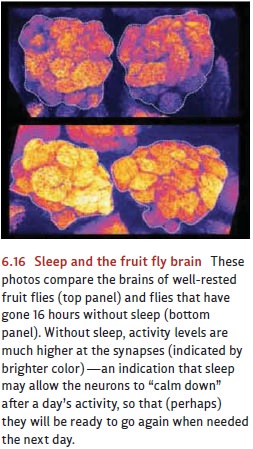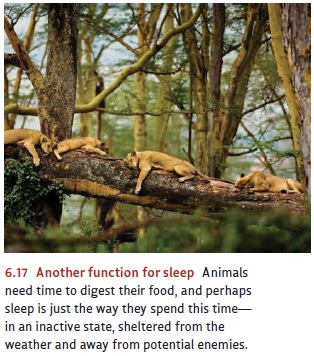Chapter: Psychology: Consciousness
Consciousness: The Function of Sleep
THE FUNCTION OF SLEEP
Sleep-deprivation studies tell us
that sleep is necessary, but they don’t tell us why. Common sense suggests one
hypothesis—the idea that sleep is restorative, allowing us to replace or
replenish some substance that’s used up when we’re awake. This idea is
supported by evidence that people do show longer periods of slow-wave sleep
under conditions of physical fatigue, when they have a greater need for bodily
recuperation (e.g., Youngstedt, O’Connor, & Dishman, 1997). Likewise,
marathon runners sleep longer during the nights just after a race, and they
spend most of that time in slow-wave sleep (Shapiro, Bortz, Mitchell, Bartell &
Jooste, 1981).
Despite these observations,
however, it has been difficult to pinpoint exactly what sleep restores. One
possibility is that during sleep, our bodies can clear out some of the cellular
waste products that are the result of routine metabolic activity (Alanko et
al., 2004). A different proposal involves certain growth hormones that our body
produces at higher rates when we’re asleep. These hormones promote body repair,
consistent with the broad idea that sleep is a time of repairing our tissues—whether
in response to some injury or just dealing with the ordinary wear and tear in
the body caused by daily life (Siegel, 2003).
Other hypotheses about sleep’s
function are also plausible. One suggestion is that brain activity during REM
sustains important brain circuits, based on the notion that synapses need
activity to maintain their strength. A different proposal is that sleeping may
in effect “reset” overstimulated neurons—perhaps to save energy and perhaps to
make sure the neurons aren’t firing at their maximum—so they’ll be ready to
fire in the next day if needed (Figure 6.16; Donlea, Ramanan, & Shaw, 2009;
Gilestro, Tunoni, & Cirelli, 2009).

Yet another proposal also focuses
on neural activity—but with a different emphasis. This hypothesis suggests that
neural activity during both REM and slow-wave sleep helps to consolidate
memories gained during the previous day (Dumay & Gaskell, 2007; Hobson,
2002; Rasch & Born, 2008; Stickgold, 2005). Consistent with this proposal,
several studies have shown that performance on certain motor tasks (such as
rapid tap-ping in a particular sequence) improves markedly after a period of
REM sleep (Mednick, Nakayama, & Stickgold, 2003; Walker, Brakefield,
Hobson, & Stickgold, 2003). Likewise, one recent study indicates a linkage
between infants’ naps and their learning—for exam-ple, learning about the
patterns of language that they hear (Gómez, Bootzin, & Nadel, 2006; for
some challenges to the idea that sleep contributes to memory consolidation, see
Miller, 2007; Rickard, Cai, Rieth, Jones, & Ard, 2008).
Obviously, then, researchers
still disagree about why we sleep; and many propos-als are being discussed. One
last proposal offers a very different perspective: Organisms need time each day
to digest their food, and this demands that they spend some hours in an
inactive state, preferably in a spot sheltered from the weather and away from
potential predators. Likewise, animals that locate their food (or mates) by
means of vision are limited in what they can do in the dark, and this too
demands a period of inactivity, away from danger. It is possible, therefore,
that sleep has no function on its own but is simply the way animals spend this
inactive time (Figure 6.17)—a period of inactivity imposed by other
considerations and

enforced by the circadian rhythm
created within the nervous system (e.g., Webb, 1974, 1994). Based on this view,
the effects of sleep deprivation may not be the result of missing out on the
benefits of sleep. Instead, sleep deprivation may just be the result of an
organism fighting against its own natural rhythms—an internal conflict that can
by itself be unsettling.
We therefore have many proposals
for why we sleep; and so far we have no evidence clearly favoring one proposal
over the others. But maybe all of these hypotheses are correct. Maybe, in the
end, sleep has all of these functions—thus underscoring the importance of sleep
for all animal species.
Related Topics